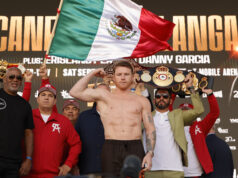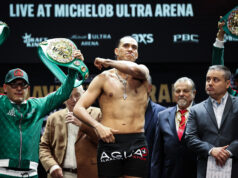By Bart Barry-

Saturday undefeated Ukrainian cruiserweight Oleksandr Usyk (14-0, 11 KOs) decisioned undefeated Latvian Mairis Briedis (23-1, 18 KOs) in the penultimate round of the World Boxing Super Series, in Latvia’s capital city of Riga. Their match graced no American airwaves. Saturday HBO’s “Boxing After Dark” program featured Argentine retread Lucas Matthysse avoiding his fifth career loss by jabbing to temporary unconsciousness a Thai fighter named, one second here, Tewa Kiram, in Los Angeles. These fights are juxtaposed for more than their common date.
What you had in Latvia were two undefeated titlists in a unification match that was the semifinal of a tournament to crown a unified cruiserweight champion of the world. And both hail from the former Eastern Bloc. Surely this was in HBO’s wheelhouse such that if HBO didn’t salivate at the bell Showtime should swoop in and spite-buy it, no?
No. Evidently, absolutely no. Dogged reporters might doggedly do reporting on this and uncover a sprawling, innocent mess of conflicting dates and logistics, a waterfall of prohibiting algorithms, that makes seamless sense of why none of this series is televised in the U.S., but here’s an unsolicited guess instead: Richard Schaefer.
The former CEO of Golden Boy Promotions is back in boxing and associated with the World Boxing Super Series, which seeks to do with the cruiserweight and super middleweight divisions what the Super Six World Boxing Classic started doing with the super middleweight division nine years ago. That tournament, excellent if snakebitten, sent aficionados to Showtime, who captured their allegiance from HBO and hasn’t yielded it much since. Back then boxing insiders confused Schaefer for a genius often as they confused him for an honest broker. But his eventual arch enemy, Bob Arum, had a true line of sight on him: Swiss banker.
Schaefer was an unscrupulous opportunist who brought contemporary accounting and marketing practices to boxing’s 18th-century way of doing both, which made him look brilliant, and a selfinterested operator who promoted an ethical approach to promoting while furtively selling his company out from under its namesake.
Schaefer, fired and barred from boxing three years ago, looks more like an Al Haymon toady, in retrospect, than a master of the universe. Whatever fellow World Boxing Super Series organizers had in mind when they hooked up with him, getting their tournament blacklisted from American television was doubtful it. That’s all conjecture, of course, but one needn’t be a fishnets-certified fanboy to see some irony in HBO’s broadcasting “Washed: The epic rebranding of Lucas Matthysse’s second comeback” in lieu of something at least five times better and more consequential.
With unfortunately few exceptions these days HBO’s Golden Boy Promotions cards are about ensuring biannual Canelo cash infusions and conceding that without access to Top Rank or PBC fighters it’s brutally hard to fill a boxing calendar. As the world moves acceleratingly away from both network television and America, the happy news for aficionados is our confinement to whatever American cable companies gift us now hurtles towards its proper end. Last weekend you didn’t need to blackpatch an eye to see Usyk-Briedis in gorgeous highdef well before Boxing After Dark lumbered along.
And what you saw in Usyk-Briedis was a very good prizefight that was oddly entertaining for a no-knockdowns affair. The gloves looked rightsized, in other words, to two 200-hundred-pound men, and both fighters, as the results got read, looked like they’d been punched oftenly. The right man won on scorecards that leaned expectedly Latvian in Riga; a forensic examination of results would find most points Briedis accumulated came via extralegal events and hometown support.
If Usyk is not a particularly large puncher he is a large man with excellent relative mobility, an Olympic gold medal that means an opponent’s style can hardly surprise him, and the sort of oblivious goofiness that supplies Tony Robbins’ charm. Usyk is a very good prizefighter but nothing like a prodigy.
Briedis, too, gave a professional accounting of himself – he was just the wrong the man against the wrong man. He wasn’t going to fight busier than Usyk and wasn’t likely to outbox him either; to get Usyk to settle down Briedis needed to worry him by concussing Usyk with every landed punch, and at the championship level Briedis does not hit hard enough to do that.
He does know some tricks, though. Howsoever inevitably and unintentionally came the early clash of heads between Usyk’s southpaw attack and Briedis’ forward-lean orthodox counterpunching, Usyk certainly got the worse of it. A Briedis baby-hiptoss in round 6, too, went someways toward destabilizing Usyk. Not enough is made generally of how much it affects a fighter to get dropped on the canvas via push or slip. The referee clears it of scoring consequence with a wave, and the felled man has no grogginess with which to contend, but his legs, trained for six weeks and a career precisely to stutterstep and twist in combat and spring upwards from a stool after respite, suddenly have to fold beneath their body and push upwards from a kneel. It’s surprisingly fatiguing. And Briedis followed Usyk’s rise from the canvas with more offensive enthusiasm and effectiveness than he’d shown to that moment.
Most every round before and after that was a copy of its predecessor, though only Usyk employed cruisecontrol and only for a little bit in the 12th round, at that.
This Saturday the second World Boxing Super Series semifinal happens with undefeated Russian Murat Gassiev (25-0, 18 KOs) and undefeated Cuban Yunier Dorticos (22-0, 21 KOs) trading fists in Russia. That one shan’t appear on American airwaves either.
Bart Barry can be reached via Twitter @bartbarry










